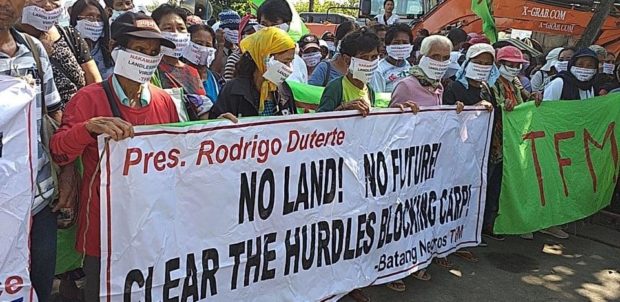Farmers accuse DAR of insincerity in finishing CARP

Peasants held a protest rally in front of the Negros Occidental provincial office of the Department of Agrarian Reform in Bacolod City to urge the agency to fulfill President Rodrigo Duterte’s promise of completing the distribution of all agricultural landholdings in the province. (Photo by Task Force Mapalad (TFM) Negros-Panay Chapter).
BACOLOD CITY – At least 1,000 Negros Occidental tillers have slammed what they called the Department of Agrarian Reform (DAR)’s insincerity in completing land distribution via the 31-year-old Comprehensive Agrarian Reform Program (CARP).
Wearing masks, the group converged and held a protest rally in front of the DAR provincial office on Monday (March 9).
They said landlessness and poverty could worsen their health risks amid the COVID-19 threat.
“Landlessness has made us poor and in turn, poverty has caused many of us to suffer from poor health,” said Teresita Tarlac, president of the national peasant federation Task Force Mapalad (TFM) Negros-Panay Chapter.
“With a highly contagious coronavirus entering our doors amid the poverty virus lingering in Negros, the DAR has made us more vulnerable to health threats and complications,” they said.
Article continues after this advertisementTarlac said they were also protesting their continued servitude and exploitation under the centuries-old hacienda system.
Article continues after this advertisement“While COVID-19 is not a death sentence, older adults like us, who are landless and poor and are mostly suffering from underlaying health conditions but don’t have access to adequate health care will be at higher risk of contracting and dying from the infectious disease if it worsens and spreads in our impoverished communities,” he said.
In January this year, President Rodrigo Duterte reiterated his vow to complete the CARP’s land acquisition and distribution (LAD) component within his term, adding that he had directed Agrarian Reform Secretary John Castriciones to fully implement the program, particularly in Negros Occidental, the province with the biggest LAD balance nationwide.
However, according to the TFM, there was a big “credibility gap” between what Duterte promised and what the DAR does.
Tarlac cited the fact that while the President’s directive was to complete LAD and prioritize the distribution of landholdings in Negros Occidental, the DAR had kept its LAD target low.